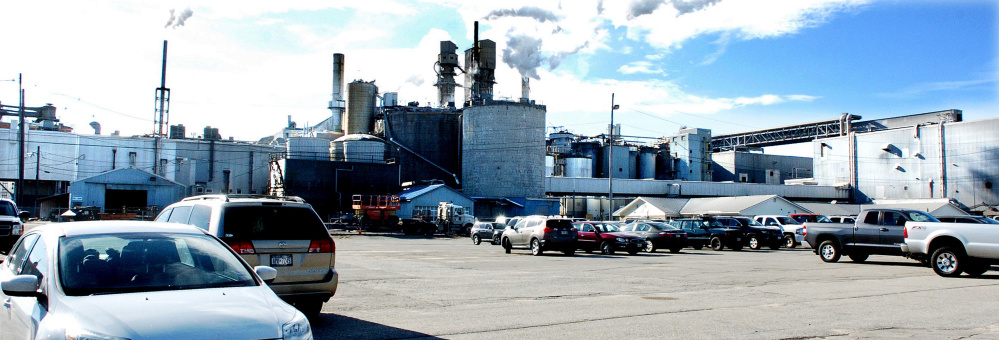Days after stakeholders said they would consider selling the Verso paper mill in Jay, Verso announced it will establish a committee to explore what it calls transaction alternatives, including the potential sale of some mills.
Verso’s announcement, which came in a U.S. Securities and Exchange Commission filing, said the company has formed a Strategic Alternatives Committee, which will continue “efforts to identify and evaluate a range of potential strategic transaction alternatives, including the possible sale of some Verso mills, engage in discussions and oversee the due diligence process with parties potentially interested in transactions with the company, and recommend to the board whether any proposed transaction is in the best interests of the company and its stockholders.”
This announcement comes shortly after the SEC filing from Mudrick Capital, a New York City-based investment firm that owns 15.3 percent of Verso’s stock. Because Verso is a public company and Mudrick owns more than 5 percent of its stock, Mudrick is required to report purchases of additional Verso stock to the SEC.
The Androscoggin Mill has faced difficulty in recent months. Earlier this summer, the mill shut down its No. 3 paper machine permanently, resulting in about 120 layoffs, though many of those workers had either found new employment or entered training programs before the machine was switched off.
Following the SEC filing from Mudrick, Kathi Rowzie, vice president of communications and public affairs at Verso, said the company continues to evaluate its options.
“With that said, there’s no assurance that this review will result in any particular alternative, and Verso will not be commenting further,” she wrote in an email.
According to its website, Mudrick Capital Management, L.P., is an investment firm that specializes in long- and short-term investments in distressed credit. It was founded in 2009 with $5 million under management. As of September, it is managing about $1.6 billion.
Verso’s new committee is made up of independent directors Eugene Davis, Alan Carr and Steven Scheiwe assisted by Houlihan Lokey Capital, Inc., Verso’s financial adviser.
In a statement, Rob Amen, Verso’s board chairman, said the company is committed to exploring “strategic transaction alternatives, and the committee will facilitate this process.”
The statement concludes that there “is no assurance that the review of strategic alternatives will result in any transaction or other strategic alternative. Verso does not intend to make any further disclosure concerning these matters until a definitive transaction agreement is reached or a determination is made that none will be pursued.”
The Mudrick filing reads: “The Reporting Persons are deeply frustrated with the Board’s inaction to address the Issuer’s rapidly deteriorating financial position. The Reporting Persons have expressed these frustrations to the Board and intend to continue its dialogue with the Board to help enact a strategic plan that will return value to stockholders, including a potential sale of the Stevens Point and Androscoggin mills. If the Board does not engage with the Reporting Persons in good faith, the Reporting Persons intend to pursue all other avenues to protect its investment.”
Rumors of a potential sale of the Jay mill have been circulating for some time, and Jay Town Manager Shiloh LaFreniere said the Mudrick SEC filing was something local officials had heard about before.
In a conference call earlier this summer, CEO Chris DiSantis said, “Androscoggin Mill is being evaluated for additional capital investment for expanded product line offerings and to enhance cogeneration capabilities.”
In that call, Verso managers said they hired a consultant to look at each of the company’s seven mills and the company as a whole to determine how to wring the best value out of them for shareholders. That consultant, global investment bank Houlihan Lokey, is the top mergers and acquisitions adviser in the country, according to Thomson Reuters. The Androscoggin Mill was singled out as an example of how converting to a new product line and reducing excess capacity would position the company to increase revenue.
The No. 5 machine is now at 78 percent capacity and growing, according to the second-quarter report. Once it achieves full capacity, it could contribute $10 million in revenue.
In an earlier filing with the SEC, Verso said severance and benefits payouts related to the shutdown of the No. 3 machine would amount to about $4 million, plus another $1 million in writing off spare parts and inventory produced on the No. 3 paper machine in 2016.
The shutdown of the No. 3 machine reduces the mill’s annual coated paper production capacity by about 200,000 tons.
The Androscoggin mill has been struggling. It laid off 120 employees earlier this summer and 300 others in 2015 as part of a plan to reduce production capacity. The Androscoggin mill is down to about 400 employees. Of the 120 who were laid off, about 20 were rehired for new positions at the mill. The mill’s employees are not unionized.
The overall economic landscape for Maine mills has been troublesome in recent years. Five mills have closed in the last few years, including Verso’s Bucksport mill in 2014, with more than 500 jobs lost. The Madison Paper mill closed in May 2016, which put more than 200 people out of work. More than 2,300 mill workers in Maine have lost their jobs since 2011.
Colin Ellis can be contacted at 861-9253 or at:
cellis@centralmaine.com
Twitter: @colinoellis
Send questions/comments to the editors.



